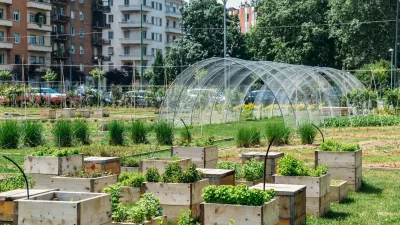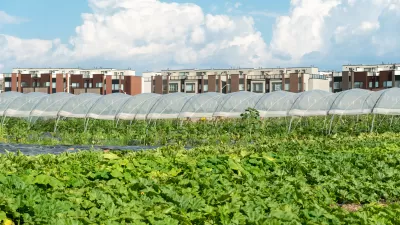With growing populations demanding more food and growing borders requiring more land, cities are one of the primary challenges to feeding the world's hunger problem. Can they also be the solution?
Summarizing issues raised at the recent “Feeding Cities” conference at the University of Pennsylvania’s Institute for Urban Research, Neal Peirce looks at the quandaries and opportunities raised by the relationship between food and cities.
"Cities themselves set up the problem," he explains. "They’re growing, both in population and the land they consume, at amazing speed, devouring often-fertile farmlands on their periphery. The population’s food demands are requiring a dramatic expansion of farmed territory. Drawn by the hope of better incomes, youth are moving to the cities, leaving agriculture to large-scale, intensive, corporate-driven farming systems and food distribution channels."
"On top of all those trends, Heather Grady of the Rockefeller Foundation noted in a keynote address, there is climate change, triggering either extreme heat or excessive rainfall and thus either drought or floods. One likely impact: price spikes, first hitting the poor who spend a large portion of their income on food."
However, by addressing two key areas - getting rid of waste in the processing, delivery and sales processes and conserving land for agriculture in, and around, urban environs - we can make significant progress towards being able to feed the 9 billion people who will inhabit the planet by 2050.
"To date, city-produced foods account for a tiny share of urban food needs," concludes Peirce. "But one is led to wonder: If city food demand is a top 21st-century concern, perhaps city ingenuity – and spirit – can also help to forge answers."
FULL STORY: Cities and Food: Quandary, Opportunity

Alabama: Trump Terminates Settlements for Black Communities Harmed By Raw Sewage
Trump deemed the landmark civil rights agreement “illegal DEI and environmental justice policy.”

Study: Maui’s Plan to Convert Vacation Rentals to Long-Term Housing Could Cause Nearly $1 Billion Economic Loss
The plan would reduce visitor accommodation by 25% resulting in 1,900 jobs lost.

Planetizen Federal Action Tracker
A weekly monitor of how Trump’s orders and actions are impacting planners and planning in America.

Waymo Gets Permission to Map SF’s Market Street
If allowed to operate on the traffic-restricted street, Waymo’s autonomous taxis would have a leg up over ride-hailing competitors — and counter the city’s efforts to grow bike and pedestrian on the thoroughfare.

Parklet Symposium Highlights the Success of Shared Spaces
Parklets got a boost during the Covid-19 pandemic, when the concept was translated to outdoor dining programs that offered restaurants a lifeline during the shutdown.

Federal Homelessness Agency Places Entire Staff on Leave
The U.S. Interagency Council on Homelessness is the only federal agency dedicated to preventing and ending homelessness.
Urban Design for Planners 1: Software Tools
This six-course series explores essential urban design concepts using open source software and equips planners with the tools they need to participate fully in the urban design process.
Planning for Universal Design
Learn the tools for implementing Universal Design in planning regulations.
Caltrans
Smith Gee Studio
Institute for Housing and Urban Development Studies (IHS)
City of Grandview
Harvard GSD Executive Education
Toledo-Lucas County Plan Commissions
Salt Lake City
NYU Wagner Graduate School of Public Service





























